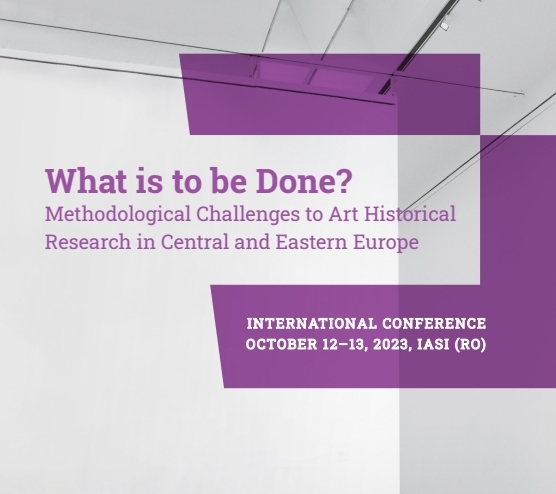 In zilele de 12 și 13 octombrie vă invităm să asistați la conferința internațională dedicată metodelor actuale de cercetare în istoria artei cu titlul „What is to be done? Methodological Challenges in Art Historical Research in Central and Eastern Europe”, ce va avea loc în corpul din strada Costache Negruzzi (fosta Horia), sala Studio.
In zilele de 12 și 13 octombrie vă invităm să asistați la conferința internațională dedicată metodelor actuale de cercetare în istoria artei cu titlul „What is to be done? Methodological Challenges in Art Historical Research in Central and Eastern Europe”, ce va avea loc în corpul din strada Costache Negruzzi (fosta Horia), sala Studio.
Mai multe detalii găsiti in documentul atașat, care conține programul conferinței.
Toți studenții ITA sunt invitați să asiste.
Conference Program
Thursday, October 12
9.45 – 10.00 – Introduction
10.00 – 12.00
Panel 1: Revisiting socialist art: state-supported institutions, exhibitions, and cultural diplomacy
Tomasz Zaluski – Introduction: In Search of New Agendas. Potential Histories of Art & Modernization Under Socialism
Maja and Reuben Fowkes – Thirty Victorious Years: an exhibition of engaged realist art from ten socialist states that didn’t shake the world
Irina Cărăbaș – Mexican Art and Cultural Diplomacy in Romania
Ljiljana Kolešnik – Yugoslav practices of cultural exchange in visual arts and politics of non-alignment
12.00 – 13.00 – Lunch break
13.00 – 15.00
Panel 2: Revisiting socialist art: artists’ networks and exhibition histories
Pavlína Morganová – Introduction – The Society of Exhibition under Socialism: what we learnt and what is there to discover in exhibition histories
Mădălina Brașoveanu – State-supported subversion or acts of deterritorialization? How to describe “the alternative” in the art exhibitions from the 1980s in Romania?
Joanna Matuszak – The Nostalgic Lens: Exhibiting Art of the Global East in the West after 1989
Daniel Grúň – From (An)Archival to Decolonial: Research into Politics of Memory in Contemporary Art
15.00 – 15.30 – Coffee break
15.30 – 16.30
Keynote lecture
Edit András – Procrustean Bed or Freudian Couch. Which is the better fit for writing East-Central European Art History?
Friday, October 13
9.00 – 10.00 – Keynote lecture
Jérôme Bazin – How to exhibit socialist realism and (post-)modernism together?
10.00 – 10. 15 – Coffee break
10.15 – 12.15
Panel 3: Social art history and Marxism in a socialist and post-socialist context.
Cristian Nae – Introduction: Marxism and Socialism: An Unavoidable Connection?
Andrea Bátorova – Art history and its narratives in former Czechoslovakia before and after 1989
Jitka Šosová – Revisiting socialist art history: the intention and reality of post-socialist turn
Emese Kürti – The Anarchist and the Alchemist. Tamás Szentjóby’s (dis)position in Marxism
12.15 – 13.30 – Lunch break
13.30 – 15.30
Panel 4: Critical art history in Eastern Europe: race and visual culture
Zsuzsa László – Introduction: The Regional Origins of Situated and Critical Art History: What We Can Learn from it Today
Jakub Banasiak – Re-enchanting 1989. How to get beyond Critical Art History and Touch the Magic of the Postcommunist Transformation?
Alexei Markin – Images of black people in Soviet Union
Uschi Klein – Photography during Romania’s communist period: a missed opportunity or just a past time?
15.30 – 16.00 – Coffee break
16.00 – 18.00
Panel 5: Critical art history in Eastern Europe: gender, labor, and decoloniality
Karolina Wilczyńska – Radical Care as Practice of Female Artists in East-Central Europe after 1989
Karolina Majewska Güde – Integrating Artistic Research in Art History: Exploring Artistic Labor under Socialism from a Transgenerational Feminist Perspective
Daryna Skrynnyk-Myska – Decolonization in the optics of Ukrainian socio-critical art after the full-scale invasion of Russia
Radek Przedpleski – Post-artistic Geomedia. Reclaiming Jerzy Ludwiński’s Environmental Art History